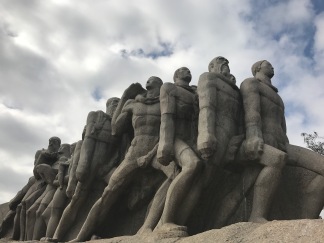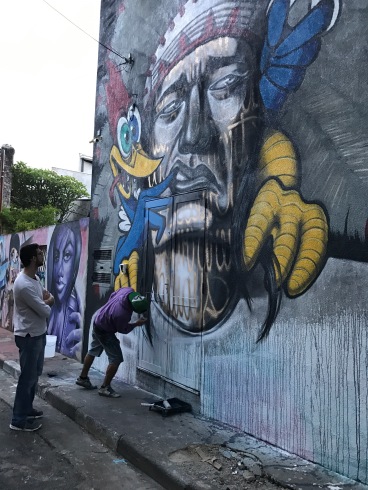
 As I get ready to leave Brazil on the last leg of my Eisenhower Fellowship my mind is racing. It has been an incredible couple of weeks here, but as I sit at the airport now, I’m reminded of the world I am returning to and how I start to connect the dots. I’m not sure how coherent my thoughts are right now as I’m really tired, but I’m going to attempt to throw out a thought or two. (And if that doesn’t work, I have lots of great photos you can look at!)
As I get ready to leave Brazil on the last leg of my Eisenhower Fellowship my mind is racing. It has been an incredible couple of weeks here, but as I sit at the airport now, I’m reminded of the world I am returning to and how I start to connect the dots. I’m not sure how coherent my thoughts are right now as I’m really tired, but I’m going to attempt to throw out a thought or two. (And if that doesn’t work, I have lots of great photos you can look at!)
In Brazil, I met with several people that referred to our mutual work in the “third space.” While it is common to refer to Non-Government or Not-for-Profit organizations as the “third sector,” this wasn’t exactly what they meant. What they were referring to was the shared sense of community that we try to foster.
For me, the hallmarks of a “community-based” arts approach have always included: active participation; intentional inclusivity; and on-going learning. But I think my Brazilian friends are right to frame our work a bit differently, as a “third space.”
If the “first place” is the home and the “second place” is the workplace, then third places are anchors of community life that should foster broader, more creative interaction. The actual definition of third space is “neutral ground.” A space in which occupants have no obligation to be there. It is a choice. It is a leveling space that puts no particular importance on an individual’s status in the community, rather allows for a sense of commonality among its occupants. There are no prerequisites or requirements that would prevent acceptance or participation in the third place. Experts have suggested that some of the elements of a true third place include: it is free or inexpensive; food and drink are important; the place is highly acce ssible; it involves regulars or people or who are habitually there; it is welcoming and comfortable; and both new friends and old should be found there. This is what the Brazilians meant!
ssible; it involves regulars or people or who are habitually there; it is welcoming and comfortable; and both new friends and old should be found there. This is what the Brazilians meant!
In so many of the places I visited and learned about, these elements stood out. I found amazing art + business incubators such as Creative Rio focused on aligning entrepreneurship with creative industries to fuel the economy; arts education programs such as Instituto Baccarelli and  Santa Teresa Ballet that wrapped their arms around kids and families in the most generous ways; performing arts organizations such as Theatre of the Oppressed that built on the work of Augusto Boal to give people tools to explore collective struggles, analyze their history and experiment with inventing a new future together through theater; and cities that used their walls as canvases to connect people and tell their story.
Santa Teresa Ballet that wrapped their arms around kids and families in the most generous ways; performing arts organizations such as Theatre of the Oppressed that built on the work of Augusto Boal to give people tools to explore collective struggles, analyze their history and experiment with inventing a new future together through theater; and cities that used their walls as canvases to connect people and tell their story.
 This serves as a great reminder to those of us working in arts and culture that our job is not to write all of the scripts, create all of the rules, or confine all the art inside our walls. Rather, the great power and beauty is that “arts and music are very democratic.” This was passionately conveyed to me by Flavio Pimento, Director of Meninos do Morumbi, who has spent 20 years using music and drumming to help kids from local favelas overcome adversity.
This serves as a great reminder to those of us working in arts and culture that our job is not to write all of the scripts, create all of the rules, or confine all the art inside our walls. Rather, the great power and beauty is that “arts and music are very democratic.” This was passionately conveyed to me by Flavio Pimento, Director of Meninos do Morumbi, who has spent 20 years using music and drumming to help kids from local favelas overcome adversity.
So let’s leave it at that for now. Let’s get busy building more third space, more opportunities to engage with each other on common ground and foster creative interaction. Brazilian theatrical legend Augusto Boal once said, “The theater itself is not revolutionary, it is a rehearsal for the revolution.” Indeed. It is through arts and culture that we can learn to transform the reality we are living into a better tomorrow.




